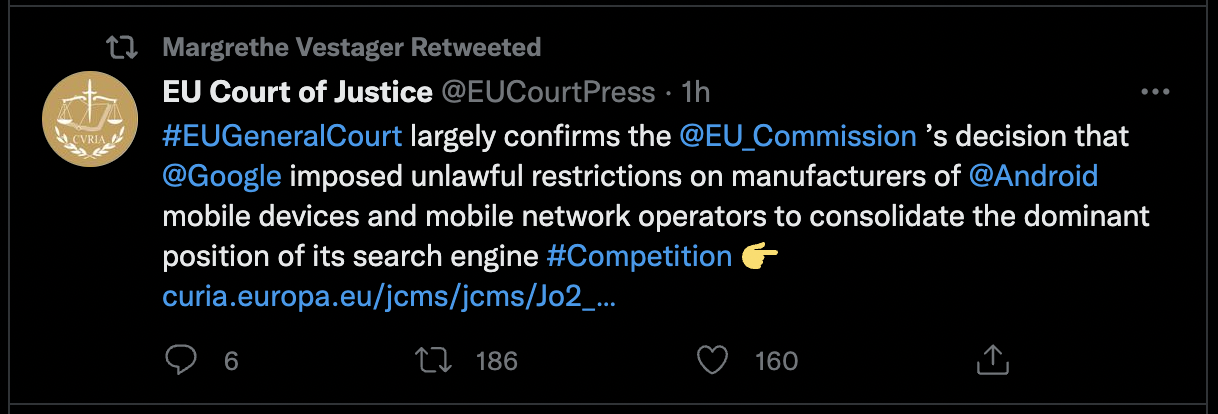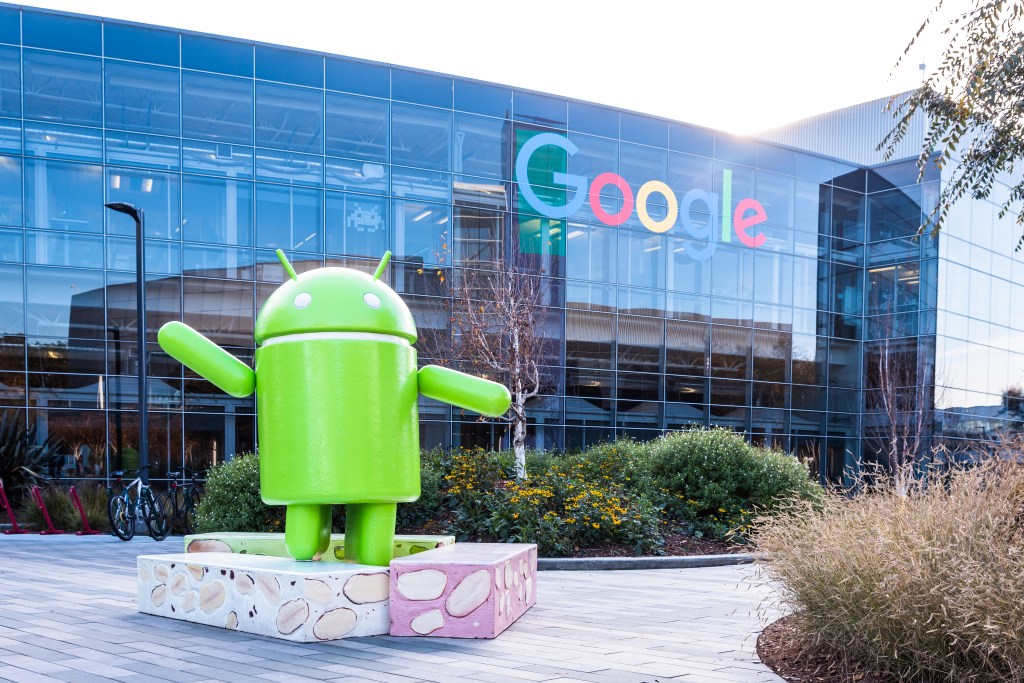Google’s appeal against a €4.34 billion antitrust fine handed down by the European Union four years ago, after the bloc’s competition regulator found major violations in how it operated its Android mobile OS, has not succeeded in overturning the decision: The EU’s General Court largely confirmed the Commission’s decision in a ruling issued today.
It’s a much needed win for the EU which has had a number of its antitrust decision unpicked by the courts in recent years.
Reached for comment, a Google spokesperson sent us this brief line:
We are disappointed that the Court did not annul the decision in full. Android has created more choice for everyone, not less, and supports thousands of successful businesses in Europe and around the world.
The size of the fine issued by the EU to Google over the Android violations in July 2018 equated to a record-breaking $5 billion at the time — and it remains unsurpassed for an EU antitrust sanction.
However the General Court has revised the size of the fine downward slightly — setting the final amount imposed on Google at (a still record-breaking) €4.125 billion (~$4.3 billion at current currency conversion rates which have seen the dollar and euro hit near parity).
#EUGeneralCourt largely confirms the @EU_Commission ’s decision that @Google imposed unlawful restrictions on manufacturers of @Android mobile devices and mobile network operators to consolidate the dominant position of its search engine #Competition 👉 https://t.co/ATb3CgbPxg
— EU Court of Justice (@EUCourtPress) September 14, 2022
A spokesperson for the Court said: “The General Court largely confirms the Commission’s decision that Google imposed unlawful restrictions on manufacturers of Android mobile devices and mobile network operators in order to consolidate the dominant position of its search engine.
“In order better to reflect the gravity and duration of the infringement, the General Court considers it appropriate however to impose a fine of €4.125BN on Google, its reasoning differing in certain respects from that of the Commission.”
Google had sought to argue that the Commission had made an error in its definition of the relevant markets and that its assessment of the restrictions Google imposed on device makers and carriers as abusive was incorrect, among a number of pleas its lawyers put to the Court.
The Court largely rejected its arguments — but in the case of a pre-installation condition included in portfolio-based revenue share agreements (with mobile makers and carriers) the justices did find fault with the Commission’s reasoning (and some procedural errors), thereby annulling that part of the Commission decision.
A Court press release summarizing the ruling notes “that partial annulment does not affect the overall validity of the [infringement] finding … in the light of the exclusionary effects arising from the other abusive practices implemented by Google during the infringement period” — but this element of the ruling explains the slight downward revision of the final fine.
In setting the final amount, the Court said it took account of “the intentional nature of the implementation of the unlawful practices and of the value of relevant sales made by Google in the last year of its full participation in the infringement,” per the press release.
Should Google wish to appeal the General Court decision to the bloc’s top court, the European Court of Justice (CJEU), it may only do so on a point of law — with a timeframe of two months and 10 days to file such a petition.
It’s not clear whether the company will seek to bring a point of law appeal to the CJEU. The company told us it is reviewing the judgment before deciding on any next steps.
The Commission has also been contacted for comment.
Update: A Commission spokesperson sent this statement:
The European Commission takes note of today’s judgment by the General Court largely confirming the Commission’s July 2018 decision which found that Google and its parent company Alphabet had abused its dominant position. The General Court also largely confirmed the fine that the European Commission imposed on Google and Alphabet and set it at €4.125 billion.
The Commission will carefully study the judgment and decide on possible next steps.
At the time of writing competition chief Margrethe Vestager had not posted publicly on the win but her Twitter account retweeted the Court’s press announcement:

Consumer groups and Google rivals were quick to welcome the Court’s decision.
In a statement, Monique Goyens, the director general of BEUC, the European consumer organization, dubbed the ruling a “crucial” win for consumers:
“Today’s General Court ruling on Google’s practices concerning Android is crucial because it confirms that Europe’s consumers must enjoy meaningful choice between search engines and browsers on their phones and tablets. The Court ruling makes clear that Google cannot abuse its strong market position to unfairly exclude competitors through a complex and illegal web of restrictions and requirements for phone manufacturers. The ruling will help to ensure that consumers can benefit from a more open and innovative digital environment,” she said, adding: “Google’s restrictions harmed many millions of European consumers by depriving them of genuine choice and innovation for a decade. In practice, many European consumers had no alternative to using Google’s search engine and Google’s browser Chrome on their mobile devices. If they preferred, for example, to use more innovative and privacy-friendly services, Google’s restrictions prevented them from doing so.”
While Ecosia, the environmentally focused not-for-profit search engine that competes with Google search — and has been a vocal critic of how the tech giant responded with skewed ‘remedies’ following the antitrust decision — also welcomed the ruling, emphasizing how much marketshare Google still retains in the region.
“Today’s decision is a significant victory for the European Commission (EC) and is a continuation of a positive trend in Europe towards fairer competition in the online search market,” said Sophie Dembinski, its head of public policy, in a statement. “Much remains to be done to bring about true fairness in the space — Google still maintains a 96.6% market share on mobile devices in Europe, down only 0.3% since 2018 when this ruling was initially made — thanks to the EC and European Parliament’s heroic efforts with the Digital Markets Act, this ruling strengthens the EU’s overall position as a leading regulatory force, capable of keeping up with fast-moving developments in the tech sector and taking the action necessary to hold tech giants accountable — something which European consumers and businesses alike will benefit from.”
Google abused dominant position of Android in India, antitrust probe finds
The 2018 EU Android decision
The 2018 EU competition Commission decision against Android found Google had abused its dominant position by imposing anticompetitive contractual restrictions on manufacturers of mobile devices using its Android OS and on mobile network operators, in some cases since the start of 2011.
The three types of restrictions the Commission identified and sanctioned were found in contract clauses in distribution agreements: Those which required mobile device makers to pre-install Google Search and its Chrome browser apps in order to be able to obtain a licence from Google to use its app store — the popular Play Store; certain ‘anti-fragmentation’ agreements Google imposed on device makers that wanted to pre-install Google Search and Play Store which required them to undertake not to sell devices running versions of the Android operating system not approved by Google; and those contained in ‘revenue share agreements,’ under which a cut of Google’s advertising revenue provided to device makers and mobile network operators was subject to their undertaking not to pre-install a competing general search service on a predefined portfolio of devices.
The Court did not agree with the Commission’s assessment of the latter restriction being abusive, as noted above.
As well as being sanctioned with a massive fine for the breaches, Google was ordered four years ago to cease the infringements. However the bloc’s competition regulator allowed the company to configure its own remedy. That resulted in several frustrating years for search competitors after Google started offering a choice screen to Android users in the EU but quickly moved to a paid auction model for assigning slots — thereby, they argued, creating an unfairly skewed playing field which penalized smaller, less well-resourced competitors and not-for-profit players.
It was only after further pressure from the EU that Google agreed to drop the paid auction — last year switching to a choice screen that’s free for eligible participants.
At the same time it expanded the number of participants displayed, showing a ‘top five’ (determined by per market popularity but displayed in a randomized order — so, of course, Google is always one of these top options given its regional marketshare.) — after which, if the user chooses to keep scrolling, they can see up to seven further options (displayed in random order). If there are more than seven additional eligible options for the market Google says the choice of which it displays is also picked randomly.
The Court ruling largely upholding the EU’s Android decision suggests these choice screens are here to stay. Plus, more such regulation-driven interventions look to be on the way in the EU as the bloc starts to enforce updated competition rules which will apply to the most powerful so-called “gatekeeper” platforms — under the incoming Digital Markets Act (DMA). And it’s certainly fair to say that EU lawmakers have taken their years of learnings from antitrust wrangles with Google — baking them into the DMA’s proactive operational rules which will be imposed on core platform services that fall in scope. So the legacy of Google’s multiple antitrust enforcements will be a lasting one.
European parliament backs ‘historic’ reboot to EU’s digital rulebook
Antitrust activity dialing up across Europe
The EU’s antitrust division has been very active in investigating Google over the past five+ years, landing a string of enforcements — including a $2.7 billion fine related to shopping searches back in 2017 (which Google largely failed to overturn on appeal).
Google was also fined $1.7 billion in a case related to AdSense, its search ad brokering business, in 2019. (Its appeal there is ongoing.)
The competition Commission also has an ongoing probe into Google’s adtech — opened in June 2021. And, on Friday, Reuters reported that the EU had widened this investigation.
The bloc is also looking into an ad deal between Google and Facebook — known as ‘Jedi Blue.’
The U.K.’s Competition and Markets Authority has similar probes of Google’s adtech ongoing too. As well as expressed concerns about the mobile duopoly — one half of which is Google Android.
While Germany’s antitrust scrutiny of the company — which touches on a number of business fronts — stepped up a gear at the start of this year when its regulator determined the tech giant falls under a special abuse controls regime brought in under a major reform of digital competition rules also aimed at proactively responding to tech giants’ market muscle.
France has also been aggressive in probing a variety of competition concerns around Google. And this summer the company dropped an appeal against a major antitrust fine — of well over half a billion dollars — that France’s competition watchdog hit it with in July 2021, related to breaches in how it negotiated terms with news publishers over copyright licensing.
All this regulatory activity is also leading to an uptick in regional antitrust litigation aimed at tech giants.
Google files appeal against Europe’s $5BN antitrust fine for Android
Google gets slapped with $5BN EU fine for Android antitrust abuse































Comment